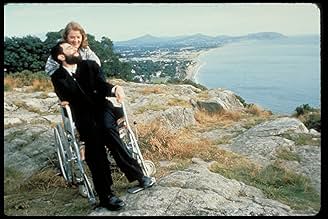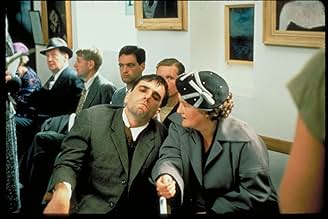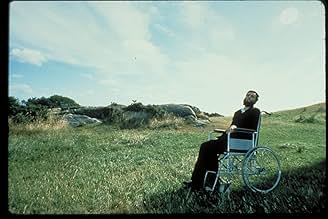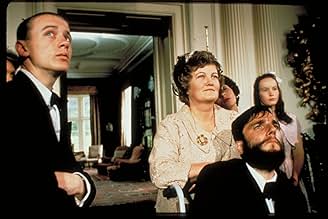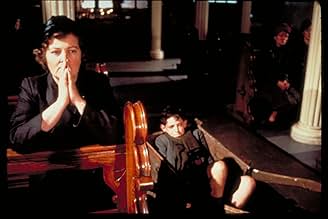अपनी भाषा में प्लॉट जोड़ेंChristy Brown, born with cerebral palsy, learns to paint and write with his only controllable limb - his left foot.Christy Brown, born with cerebral palsy, learns to paint and write with his only controllable limb - his left foot.Christy Brown, born with cerebral palsy, learns to paint and write with his only controllable limb - his left foot.
- निर्देशक
- लेखक
- स्टार
- 2 ऑस्कर जीते
- 23 जीत और कुल 20 नामांकन
Pat Laffan
- Barman
- (as Patrick Laffan)
Owen Sharpe
- Young Tom
- (as Owen Sharp)
फ़ीचर्ड समीक्षाएं
10llltdesq
Let me state at the outset that I have Cerebral Palsy and I went into this film expecting to have to make allowances for the lead performance. I left the theater half-convinced that they'd cast an actor who had Cerebral Palsy in the role, even though I knew that was not the case. The performances were generally excellent, with a special nod to Brenda Fricker and to Hugh O'Conner (I believe that's his name) as the young Christy Brown. Christy is talented, brash, arrogant, at times vulgar and petulant-in other words, human. This film, along with Gaby: A True Story and the documentary King Gimp, are excellent portrayals of life with CP. By no means a complete portrait, but fine examples of the disabled as human beings. Most highly recommended.
A noted cinematic phenomenon of the late eighties and early nineties was the number of Oscars which went to actors playing characters who were either physically or mentally handicapped. The first was Marlee Matlin's award for "Children of a Lesser God" in 1986, and the next ten years were to see another "Best Actress" award (Holly Hunter for "The Piano" in 1994) and no fewer than five "Best Actor" awards (Dustin Hoffman in 1988 for "Rain Man", Daniel Day-Lewis in 1989 for "My Left Foot", Al Pacino in 1992 for "Scent of a Woman", Tom Hanks in 1994 for "Forrest Gump" and Geoffrey Rush in 1996 for "Shine") for portrayals of the disabled. Matlin, who played a deaf woman, is herself deaf, but all the others are able-bodied.
This phenomenon aroused some adverse comment at the time, with suggestions being made that these awards were given more for political correctness than for the quality of the acting. When Jodie Foster failed to win "Best Actress" for "Nell" in 1994 some people saw this as evidence of a backlash against this sort of portrayal. My view, however, is that the majority of these awards were well deserved. I thought the 1992 award should have gone to either Clint Eastwood or Robert Downey rather than Pacino, but apart from that the only one with which I disagreed would have been Hanks', and that was because I preferred Nigel Hawthorne's performance in "The Madness of King George". In that film, of course, Hawthorne played a character who was mentally ill.
"My Left Foot" was based upon the autobiography of the Irish writer and painter Christy Brown. Brown was born in 1931, one of the thirteen children of a working-class Dublin family. He was born with cerebral palsy and was at first wrongly thought to be mentally handicapped as well. He was for a long time incapable of deliberate movement or speech, but eventually discovered that he could control the movements of one part of his body, his left foot (hence the title). He learned to write and draw by holding a piece of chalk between his toes, and went on to become a painter and a published novelist and poet.
Life in working-class Dublin in the thirties and forties could be hard, and the city Jim Sheridan (himself a Dubliner) shows us here is in many ways a grim, grey, cheerless place, very different from our normal idea of the "Emerald Isle". (Sheridan and Day-Lewis were later to collaborate on another film with an Irish theme, "In the Name of the Father"). Against this, however, must be set the cheerfulness and spirit of its people, especially the Brown family. Much of Christy's success was due to the support he received from his parents, who refused to allow him to be institutionalised and always believed in the intelligence hidden beneath a crippled exterior, and from his siblings. We see how his brothers used to wheel him round in a specially-made cart and how they helped their bricklayer father to build Christy a room of his own in their back yard.
The film could easily have slid into sentimentality and ended up as just another heart-warming "triumph over adversity" movie. That it does not is due to a number of factors, principally the magnificent acting. In the course of his career, Day-Lewis has given a number of fine performances, but this, together with the recent "There Will Be Blood", is his best. He is never less than 100% convincing as Christie; his tortured, jerky movements and strained attempts at speech persuade us that we really are watching a disabled person, even though, intellectually, we are well aware that Day-Lewis is able-bodied. The other performances which stand out are from Fiona Shaw as his mentor Dr Eileen Cole, from Hugh O'Conor as the young Christy and from Brenda Fricker as Christy's mother (which won her the "Best Supporting Actress" award).
The other reason why the film escapes sentimentality is that it does not try to sentimentalise its main character. Christy Brown had a difficult life, but he could also be difficult to live with, and the film gives us a "warts and all" portrait. He was a heavy drinker, given to foul language and prone to outbursts of rage. He could also be selfish and manipulative of those around him, and the film shows us all these aspects of his character. Of course, it also shows us the positive aspects- his courage, his determination and his wicked sense of humour. Day-Lewis's acting is not just physically convincing, in that it persuades us to believe in his character's disability, but also emotionally and intellectually convincing, in that it brings out all these different facets of Christy's character. His Oscar was won in the teeth of some very strong opposition from the likes of Robin Williams and Kenneth Branagh, but it was well deserved. 8/10
This phenomenon aroused some adverse comment at the time, with suggestions being made that these awards were given more for political correctness than for the quality of the acting. When Jodie Foster failed to win "Best Actress" for "Nell" in 1994 some people saw this as evidence of a backlash against this sort of portrayal. My view, however, is that the majority of these awards were well deserved. I thought the 1992 award should have gone to either Clint Eastwood or Robert Downey rather than Pacino, but apart from that the only one with which I disagreed would have been Hanks', and that was because I preferred Nigel Hawthorne's performance in "The Madness of King George". In that film, of course, Hawthorne played a character who was mentally ill.
"My Left Foot" was based upon the autobiography of the Irish writer and painter Christy Brown. Brown was born in 1931, one of the thirteen children of a working-class Dublin family. He was born with cerebral palsy and was at first wrongly thought to be mentally handicapped as well. He was for a long time incapable of deliberate movement or speech, but eventually discovered that he could control the movements of one part of his body, his left foot (hence the title). He learned to write and draw by holding a piece of chalk between his toes, and went on to become a painter and a published novelist and poet.
Life in working-class Dublin in the thirties and forties could be hard, and the city Jim Sheridan (himself a Dubliner) shows us here is in many ways a grim, grey, cheerless place, very different from our normal idea of the "Emerald Isle". (Sheridan and Day-Lewis were later to collaborate on another film with an Irish theme, "In the Name of the Father"). Against this, however, must be set the cheerfulness and spirit of its people, especially the Brown family. Much of Christy's success was due to the support he received from his parents, who refused to allow him to be institutionalised and always believed in the intelligence hidden beneath a crippled exterior, and from his siblings. We see how his brothers used to wheel him round in a specially-made cart and how they helped their bricklayer father to build Christy a room of his own in their back yard.
The film could easily have slid into sentimentality and ended up as just another heart-warming "triumph over adversity" movie. That it does not is due to a number of factors, principally the magnificent acting. In the course of his career, Day-Lewis has given a number of fine performances, but this, together with the recent "There Will Be Blood", is his best. He is never less than 100% convincing as Christie; his tortured, jerky movements and strained attempts at speech persuade us that we really are watching a disabled person, even though, intellectually, we are well aware that Day-Lewis is able-bodied. The other performances which stand out are from Fiona Shaw as his mentor Dr Eileen Cole, from Hugh O'Conor as the young Christy and from Brenda Fricker as Christy's mother (which won her the "Best Supporting Actress" award).
The other reason why the film escapes sentimentality is that it does not try to sentimentalise its main character. Christy Brown had a difficult life, but he could also be difficult to live with, and the film gives us a "warts and all" portrait. He was a heavy drinker, given to foul language and prone to outbursts of rage. He could also be selfish and manipulative of those around him, and the film shows us all these aspects of his character. Of course, it also shows us the positive aspects- his courage, his determination and his wicked sense of humour. Day-Lewis's acting is not just physically convincing, in that it persuades us to believe in his character's disability, but also emotionally and intellectually convincing, in that it brings out all these different facets of Christy's character. His Oscar was won in the teeth of some very strong opposition from the likes of Robin Williams and Kenneth Branagh, but it was well deserved. 8/10
'My Left Foot' is the remarkable story of Christy Brown, born into a working-class Irish family with cerebral palsy. Growing up in a life full of poverty and extreme prejudice, Christy defied everyone's expectations. Using his left foot, the only part of his body he had proper control over, the young man learned to write and paint.
I could spend this review talking about the film's excellent portrayal of working class Ireland, and the working class Irish family specifically. I could talk about how the film does a good job of showing how the attitudes towards Christy Brown changed as Ireland's own political landscape changed. I could probably also talk about the role of women in Christy's life, from his mother and sisters, to the loves in his life. All of these things are worthy of mention.
However, when talking about 'My Left Foot', there is one thing that stands out above everything else; that being Daniel Day-Lewis. Day-Lewis had already proved his acting chops in the excellent 'My Beautiful Laundrette, but it was this movie that put him on the map globally. And rightly so: he is absolutely fantastic as Christy Brown.
Acting is difficult at the best of times, when you're playing a fully-functioning human being. What Day-Lewis achieves, therefore, is even more admirable. It is an extremely effective and realistic portrayal of someone suffering from cerebral palsy, and the actor goes gung-ho with both the physicality expressiveness required for the role. It is a joy to watch.
An honourable mention also needs to go to Hugh O'Conor, who plays the younger Brown. I can only assume that it is even harder for a child to go through the rigours that the role requires, but O'Conor is brilliant. What makes the character difficult to play is that, in trying to make it look real physically, the emotion required can be lost. Both actors avoid that problem with what seems like relative ease: at no point does the efficacy or emotion of the moments falter.
All the other stuff mentioned above are worthy of talking about, if I intended to write a longer review. But for this small thing, I think it is more than enough to say that 'My Left Foot' deserves to be seen just for this landmark Daniel Day-Lewis performance. Whatever you may think of the film as a whole, or whether you care about the story of Christy Brown or not, it is secondary to the simple appreciation for an actor at the top of his game.
I could spend this review talking about the film's excellent portrayal of working class Ireland, and the working class Irish family specifically. I could talk about how the film does a good job of showing how the attitudes towards Christy Brown changed as Ireland's own political landscape changed. I could probably also talk about the role of women in Christy's life, from his mother and sisters, to the loves in his life. All of these things are worthy of mention.
However, when talking about 'My Left Foot', there is one thing that stands out above everything else; that being Daniel Day-Lewis. Day-Lewis had already proved his acting chops in the excellent 'My Beautiful Laundrette, but it was this movie that put him on the map globally. And rightly so: he is absolutely fantastic as Christy Brown.
Acting is difficult at the best of times, when you're playing a fully-functioning human being. What Day-Lewis achieves, therefore, is even more admirable. It is an extremely effective and realistic portrayal of someone suffering from cerebral palsy, and the actor goes gung-ho with both the physicality expressiveness required for the role. It is a joy to watch.
An honourable mention also needs to go to Hugh O'Conor, who plays the younger Brown. I can only assume that it is even harder for a child to go through the rigours that the role requires, but O'Conor is brilliant. What makes the character difficult to play is that, in trying to make it look real physically, the emotion required can be lost. Both actors avoid that problem with what seems like relative ease: at no point does the efficacy or emotion of the moments falter.
All the other stuff mentioned above are worthy of talking about, if I intended to write a longer review. But for this small thing, I think it is more than enough to say that 'My Left Foot' deserves to be seen just for this landmark Daniel Day-Lewis performance. Whatever you may think of the film as a whole, or whether you care about the story of Christy Brown or not, it is secondary to the simple appreciation for an actor at the top of his game.
After watching The Left Foot, I have came to the conclusion that Daniel-Day Lewis the greatest actor alive and perhaps the greatest actor ever! But for the film itself, it's a powerful film that's well directed, well-acted, masterfully written, and provokes a good amount of emotion. But most of all, it spreads awareness about this handicap. Cerebral Palsy is something people should know about this and while not a propaganda piece, this film does a good job on giving the audience information about this disorder.
Jim Sheridan's film tells the biography of a man named Christy Brown. Born with cerebral palsy, the story goes from his tough childhood to his even tougher adulthood where he becomes an expert writer and painter despite the fact he only has mobility with his left foot.
Now on to Daniel Day-Lewis. I think people would agree with me on where I stand with him as an actor. He puts every ounce of effort into his roles and he acts as if he is actually the character he is portraying. After his roles in "In the Name of the Father", "Lincoln", "Gangs of New York", and "There Will Be Blood," I can honestly say he is the best actor ever. Also, I must single out Brenda Fricker in this role as Christy's mother because she does such an amazing job.
Overall, My Left Foot is a wonderful film that tells a story of a condition that many people must suffer through. I am glad there is a film that brings proper awareness to the condition and hence, much emotion is provoked. On technical terms, this film not the best since I felt it could use just a little better editing. But story-wise, yes it is perfect. I rate this film 9/10.
Jim Sheridan's film tells the biography of a man named Christy Brown. Born with cerebral palsy, the story goes from his tough childhood to his even tougher adulthood where he becomes an expert writer and painter despite the fact he only has mobility with his left foot.
Now on to Daniel Day-Lewis. I think people would agree with me on where I stand with him as an actor. He puts every ounce of effort into his roles and he acts as if he is actually the character he is portraying. After his roles in "In the Name of the Father", "Lincoln", "Gangs of New York", and "There Will Be Blood," I can honestly say he is the best actor ever. Also, I must single out Brenda Fricker in this role as Christy's mother because she does such an amazing job.
Overall, My Left Foot is a wonderful film that tells a story of a condition that many people must suffer through. I am glad there is a film that brings proper awareness to the condition and hence, much emotion is provoked. On technical terms, this film not the best since I felt it could use just a little better editing. But story-wise, yes it is perfect. I rate this film 9/10.
Daniel Day Lewis is one of the best actors of our time and one of my favorites. It is amazing how much he throws himself in each of the characters he plays making them real.
I remember, many years ago, we had a party in our house - the friends came over, we were sitting around the table, eating, drinking the wine, talking, laughing - having a good time. The TV was on - there was a movie which we did not pay much attention to. Then, suddenly, all of us stopped talking and laughing. The glasses did not clink, the forks did not move, the food was getting cold on the plates. We could not take our eyes off the screen where the young crippled man whose entire body was against him and who only had a control over his left foot, picked up a piece of chalk with his foot and for what seemed the eternity tried to write just one word on the floor. When he finished writing that one word, we all knew that we had witnessed not one but three triumphs - the triumph of a human will and spirit, the triumph of the cinema which was able to capture the moment like this on the film, and the triumph of an actor who did not act but who became his character.
Jim Sheridan's "My Left Foot" is an riveting, unsentimental bio-drama about Christy Brown, the man who was born with cerebral palsy in a Dublin slum; who became an artist and a writer and who found a love of his life.
I like every one of Day Lewis's performances (I have mixed feelings about his performance in GONY) but I believe that his greatest role was Christy Brown in "My Left Foot"
I remember, many years ago, we had a party in our house - the friends came over, we were sitting around the table, eating, drinking the wine, talking, laughing - having a good time. The TV was on - there was a movie which we did not pay much attention to. Then, suddenly, all of us stopped talking and laughing. The glasses did not clink, the forks did not move, the food was getting cold on the plates. We could not take our eyes off the screen where the young crippled man whose entire body was against him and who only had a control over his left foot, picked up a piece of chalk with his foot and for what seemed the eternity tried to write just one word on the floor. When he finished writing that one word, we all knew that we had witnessed not one but three triumphs - the triumph of a human will and spirit, the triumph of the cinema which was able to capture the moment like this on the film, and the triumph of an actor who did not act but who became his character.
Jim Sheridan's "My Left Foot" is an riveting, unsentimental bio-drama about Christy Brown, the man who was born with cerebral palsy in a Dublin slum; who became an artist and a writer and who found a love of his life.
I like every one of Day Lewis's performances (I have mixed feelings about his performance in GONY) but I believe that his greatest role was Christy Brown in "My Left Foot"
क्या आपको पता है
- ट्रिवियाAccording to the "Making of My Left Foot" segment on the Special Edition DVD, Sir Daniel Day-Lewis broke two ribs during filming from assuming the hunched-over position in his wheelchair for weeks of filming. He also would refuse to come out of character. On visits to the set canteen, other people would have to help him with food. On one visit from his English agent, Day-Lewis again refused to come out of character as Christy Brown, and his frustrated agent took off.
- गूफ़In the beginning of the movie, when Mary Carr gets Christy Brown into the library, the shadow of the boom mic can clearly be seen on a white door.
- भाव
Christy Brown: I've had nothing but Platonic love all me life. Do you know what I say? FUCK PLATO! And fuck all love that's not a hundred percent commitment!
- साउंडट्रैकFoggy Dew
(uncredited)
Traditional
टॉप पसंद
रेटिंग देने के लिए साइन-इन करें और वैयक्तिकृत सुझावों के लिए वॉचलिस्ट करें
- How long is My Left Foot?Alexa द्वारा संचालित
विवरण
- रिलीज़ की तारीख़
- कंट्री ऑफ़ ओरिजिन
- आधिकारिक साइटें
- भाषा
- इस रूप में भी जाना जाता है
- Mi pie izquierdo: la historia de Christy Brown
- फ़िल्माने की जगहें
- उत्पादन कंपनियां
- IMDbPro पर और कंपनी क्रेडिट देखें
बॉक्स ऑफ़िस
- बजट
- £6,00,000(अनुमानित)
- US और कनाडा में सकल
- $1,47,43,391
- US और कनाडा में पहले सप्ताह में कुल कमाई
- $41,165
- 12 नव॰ 1989
- दुनिया भर में सकल
- $1,47,43,391
इस पेज में योगदान दें
किसी बदलाव का सुझाव दें या अनुपलब्ध कॉन्टेंट जोड़ें

टॉप गैप
What is the Hindi language plot outline for My Left Foot: The Story of Christy Brown (1989)?
जवाब


